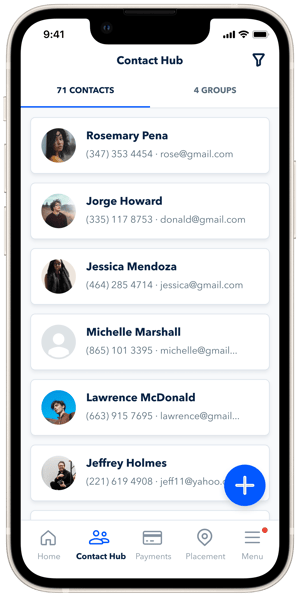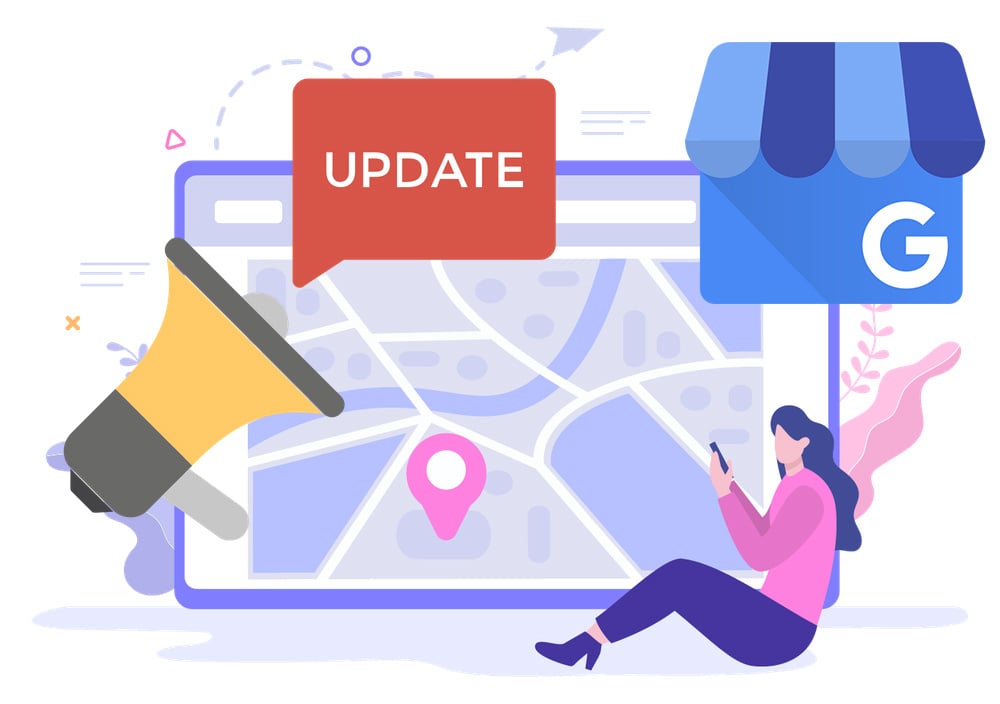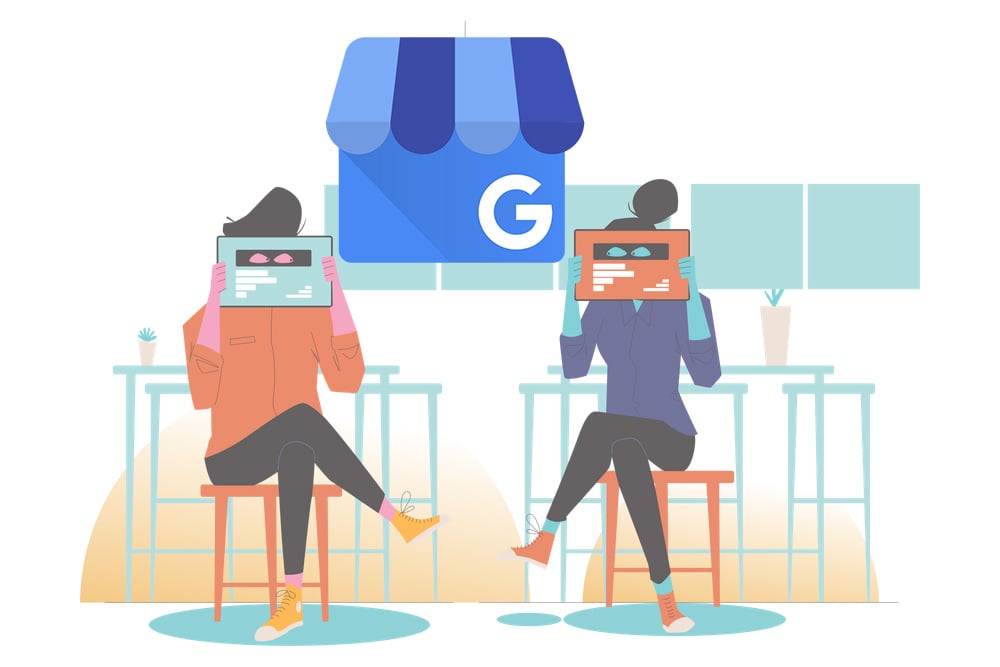Selling Landscaping Services: Unlocking the Secrets to Local Growth
Not sure how to sell landscaping services locally? Learn proven strategies for selling services in your area, from door knocking to digital marketing.
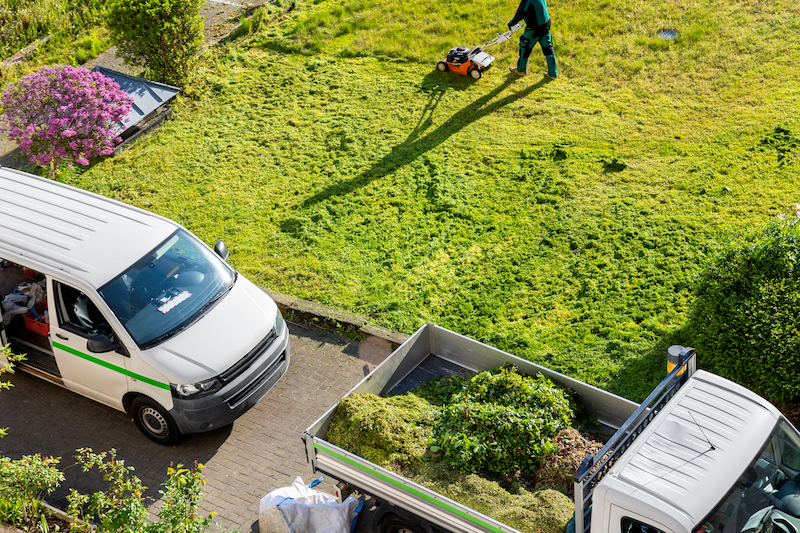
Remember the classic sales challenge: 'Sell me this pen.' For you, the task at hand is to sell your neighborhood on your top-notch landscaping services.
You might think that a lack of sales experience is a roadblock to growing your small business. Well, think again. You don't need to be a Wall Street whiz to transform your budding landscaping operation into one of the most profitable ventures in your community. This blog is your roadmap to achieving just that.

Jump To:
- Finding Customers—The Local Landscaper's Way
- Knowing Your Landscaping Customer
- Creating a Compelling Sales Pitch
- Retaining Your Customers
- Keeping Track of All Your Sales Contacts
- Conclusion
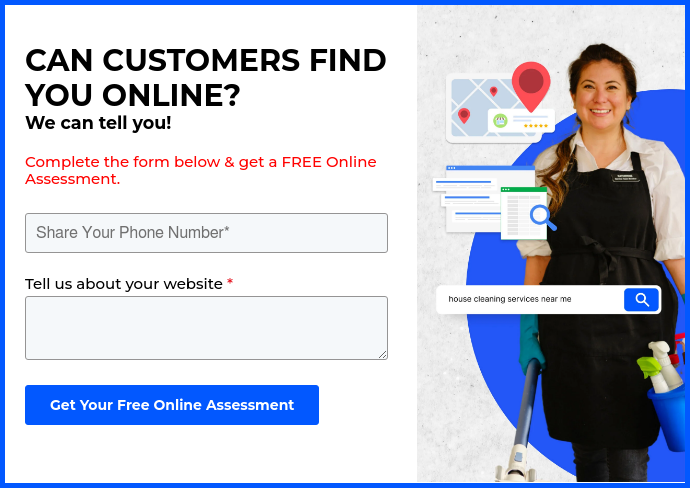
Finding Customers—The Local Landscaper's Way
You've seen all the yard work Youtubers and TikTokers out there sharing their stories of $0 to $50,000 (or more!) when launching their own businesses. It almost seems too good to be true.
Well, if you're not willing to work hard, then it might be a pipe dream for you. But what's more likely is that you want to go into business for youself because you WANT to work hard and make it count for something.
So if that describes you, then these Youtubers and TikTokers are a reasonable goal that you should shoot for. But where you do you start? You need customers. So let's talk about the two ways you're going to get customers: inbound and outbound sales.
Getting Customers to Call You (Inbound Lead Generation)
Obviously, getting customers to call you without you having to chase them down is the best way to get new leads. But getting to this point will take some setup and maintenance on your end.
The benefits of investing in your inbound lead generation include:
- These leads are cheaper. You don't have to pay for call centers or advertising to get them.
- They save you a lot of time. You don't have to cold call or knock on doors to get them.
- These leads are higher quality. They came to you, so they are far more interested in booking your landscaping services than if you interrupted their lives with ads or calls to book them.
Your Digital Presence
Cost: $0-1000
In the age of smartphones and Google searches, having a strong online presence is crucial for your local landscaping business.
Potential clients will often search online for local landscaping services, and you want to be the name that pops up. You can achieve this by having a well-designed website that showcases your portfolio of work, client testimonials, and clear call-to-action buttons like 'Contact Us' or 'Get a Free Quote.'
Additionally, that you spend a little time creating, verifying, and improving your Google My Business profile. This will enable you to appear in local searches and provide a platform for customer reviews, which is another powerful form of inbound marketing.
(Image above) This is what happens on Google when you search for "landscaping services near me" and the individual lives in Sacramento, California.
You should also focus on Search Engine Optimization (SEO) to enhance your online visibility. Think of SEO as the equivalent of prime real estate in a shopping mall. You want your business to be front and center when people are "window shopping" online for landscaping services.
Yard Signs
Cost: $10-50 per yard sign
You should never overlook the potential of a strategically placed yard sign. After finishing a project, it's worth asking the homeowner if you can place a yard sign on their property for a week or two.
People walking or driving by will see it, and it will serve as a visual testimony to your work's quality. It can be more impactful than any online advertisement, making the property itself a billboard for promoting your work.
To amplify the effect of your yard signs, you should order professionally designed signs that include vital information such as your business name, website and contact number.
You could also pair the yard sign with a brochure or before-and-after photo board that interested passers-by can take with them to learn more about the work you do. Remember, yard signs are more than just pieces of plastic or wood; they act as silent salespeople, working round-the-clock to attract potential leads.
Local Word-of-Mouth
Cost: Free
Your happiest clients are your most effective brand ambassadors. When they host gatherings or events in their backyard, and someone asks about their landscaping, you want your name to be the one mentioned. Encourage satisfied clients to spread the word by providing a small discount or a bonus service for every new customer they refer.
Don't hesitate to ask for testimonials that you can showcase on your website or social media platforms. In today's interconnected world, positive reviews can be shared and reshared, significantly expanding the reach of those personal endorsements.
You can also create a 'Proudly Landscaped by [Your Company Name]' badge that clients can display in their yards or gardens. This badge serves as a conversation starter and a symbol of quality that the local community will come to recognize and trust.
Going Out & Gathering New Customers (Outbound Lead Generation
There were always be times in your business when you need to step out and connect with new customers yourself. This is especially true if you're new in town or are looking to add crews and grow rapidly.
Knocking on Doors
Cost: Free
Yes, it may sound old-fashioned, but knocking on doors still works, especially in the landscaping business where your work is visible to neighbors.
The key is to choose the right doors, ideally those next to properties where you've recently completed projects. Bring along a portfolio, whether on a tablet or in print, and be ready to discuss the range of services you offer and how you can enhance their yard's potential.
If a homeowner seems interested but not yet ready to commit, offer a free consultation right then and there. Remember, you're not just promoting a service; you're selling a vision of a more beautiful and functional outdoor space.
Cold Calls
Cost: Free
Cold calling may not be your preferred activity, but it can be effective if you approach it correctly. Start by creating a list of properties that could benefit from your services, such as those with an untidy or poorly maintained yard. Public property records or even Google Maps is an excellent source for such information.
When you make the call, be direct yet polite and quickly identify a problem that your landscaping services can solve. For example, you could mention a seasonal promotion on lawn aeration or offer a discount to new clients. The critical point is to be respectful of their time while concisely explaining how you can improve their outdoor space.
Cold Emails
Cost: Free
While cold emails cannot replicate the personal connection of a face-to-face meeting or phone call, they can be highly successful when executed correctly. It is most effective when you use cold emails on the same people you're calling, knocking on doors, or sending direct mail to.
Begin by creating an attention-grabbing subject line to increase the chances of your email being opened. For example, you could use something like "Turn Your Backyard into a Serene Oasis". Keep the email itself concise, but visually appealing with images showcasing your previous work. Include a clear call-to-action, such as "Claim Your Free Consultation".
If you don't receive a response, always follow up after a week or two. It is vital to customize each email to make the recipient feel valued; nobody wants to receive an obviously generic email.
Direct Mail
Cost: $20-50 per new customer
When it comes to direct mail, targeting the right areas can make a significant impact, especially in locations where you've recently completed projects. Create a simple yet powerful postcard that showcases an impressive before-and-after photo of a local yard you have transformed.
Include a special promotional offer to motivate recipients to respond. The crucial element of successful direct mail is targeting: Send your materials to neighborhoods that align with your ideal client profile, such as new homeowners, high-income areas, or locations with spacious yards.
Digital Ads
Cost: $20-200 per new customer
You can use online advertising platforms like Facebook or Google to reach and target specific neighborhoods or groups of people who are interested in landscaping. These digital ads allow you to use eye-catching images and compelling content to capture the attention of potential customers.
A unique approach for landscapers could be showcasing 'before and after' images to demonstrate the transformations they can provide. With the geo-targeting features available (that is, targeting prospects in your immediate area), you can focus your advertising efforts on specific locations, making them more cost-effective and tailored to your desired audience.
Knowing Your Landscaping Customer
For any business, including landscaping, comprehending your target customer is essential. It is critical to be aware of who your customers are, what services they require, and how much to charge them to achieve success.
Who They Are
To begin with, it is important to identify the specific type of customer that you are most likely to cater to. Are they homeowners who value a well-maintained yard but lack the time or skills to do so themselves? Or, do they include property managers responsible for apartment complexes or commercial properties? Different customers will have varying priorities, budgets, and expectations.
To gain a clearer understanding of your ideal customer, it can be helpful to create a customer persona. This involves developing a detailed profile of a typical customer, including information such as demographics, psychographics, and the challenges they face.
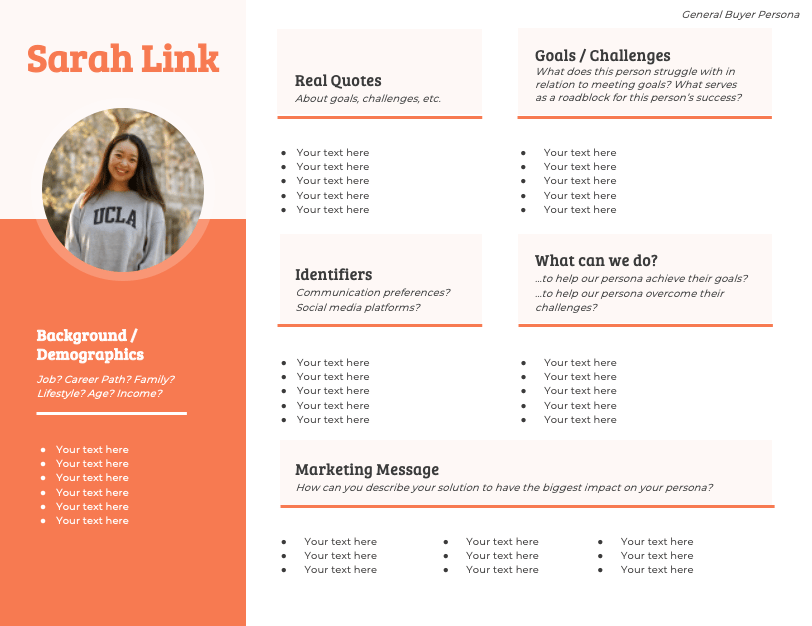 The image above is an example from HubSpot's free buyer persona template exercise.
The image above is an example from HubSpot's free buyer persona template exercise.
This exercise allows you to customize your marketing and sales approach to resonate with this target audience. For example, young families may be focused on safe, chemical-free lawn treatments, while retirees may be interested in low-maintenance landscaping options.
What They Need
Once you have a solid understanding of your customers, the next step is to explore their specific needs and how your services can fulfill them. Some homeowners may simply require regular lawn maintenance, while others may desire comprehensive landscape makeovers, which could involve adding elements like patios, water features, or outdoor kitchens.
Your role is to uncover these needs through direct conversations, customer surveys, or even observation. By paying attention to trends such as overgrown lawns or underutilized outdoor spaces in your community, you can identify opportunities to address these issues. It's important to communicate how your services can solve their specific problems or enhance their overall outdoor living experience.
What You Should Charge
Determining pricing is a nuanced task that involves finding the right balance between market conditions and the value of your services. Various factors, such as labor costs, equipment expenses, and materials, all contribute to pricing decisions.
However, just as crucial is your knowledge of your customer's budget.
Are you targeting a high-end market that values exclusivity and is willing to pay a premium for your services? Or is your focus on middle-income households that prioritize reliability and affordability? Understanding your customer's budget is essential in setting the appropriate pricing strategy.
Irrespective of your target market, it is important to consistently provide value that warrants the cost.
For instance, if your services are priced higher, it is crucial to explain the additional advantages that customers will receive, such as personalized designs or eco-friendly solutions. On the other hand, if you are competing on price, emphasize the reliability and efficiency of your services.
By highlighting these key selling points, you can justify the cost and ensure that customers perceive the value in what you offer.
Creating a Compelling Sales Pitch
Your sales pitch is the core message that will convince potential customers to choose your services over your competitors. Let's discuss how to refine your pitch, ensuring it covers every crucial step of the customer journey, from capturing initial interest to finalizing a new customer deal.
Establishing a Professional Landscaping Brand
Before you utter a single word to a potential customer, your brand is already sending a message. Make sure to dress the part (uniforms with your business logo are fantastic for this), and ensure any visual branding you use - logos, website, social media profiles, yard signs, etc. - have the same style and look.
It's essential to focus your branding on solving the customer's biggest problems. Whether they're tired of dealing with weeds, want to boost property value, or are seeking a low-maintenance yard, your sales message should make it clear that you have the solutions they need.
Ensure your logo, social media, and marketing materials hammer home this sales message, making you the go-to problem-solver in the landscaping arena.
What To Say to "Get Your Foot in the Door"
The first words you share with a potential customer are pivotal. Whether you're making a cold call or sending an initial email, your opening line should pique curiosity and offer a hint of the value you can provide.
For example, a cold call might start with, "Hi, I'm [Your Name], and I specialize in weed-free, beautiful yards year-round. May I tell you how?" For an email, consider a subject line like, "Achieve a Picture-Perfect Yard with Zero Hassle." The objective is to make them want to learn more about how you can solve their specific issues.
Lastly, make sure you use professional greetings as the norm. Your voicemail greeting should sound friendly and say your business name. Every time your phone rings, assume it's a new customer by saying, "Hello this is [first name] with [business name]. How can I help you?"
What To Say When You Have Their Attention
No one will care about who you are or what you do unless they instantly understand the value you provide.
Once you've grabbed their interest, this is your chance to delve into the nitty-gritty of what makes your service indispensable. Highlight the solutions you offer to their most significant pain points. For instance, you could say, "We have a specialized treatment that ensures your lawn stays lush but is virtually maintenance-free." Or you might offer, "We design drought-tolerant landscapes that save you money on water bills." Focus on how your services address their specific needs or problems, offering tangible benefits that set you apart.
What to Say To Close the Deal
Once you have captured their interest and explained how you can address their problems, it is time to finalize the agreement. This is the stage where pricing, available packages, and any special promotions should be discussed.
For instance, you might mention, "If you take action now, we are currently offering a seasonal package that caters to all your lawn care needs at a discounted rate of 20%." Alternatively, you could ask, "Are you prepared to bid farewell to the hassle of yard maintenance once and for all?"
The closing stage should be designed to make it as easy as possible for them to select your services. Remove any hurdles they may have, whether it is related to pricing concerns or scheduling, and present an offer that is hard to resist.
Retaining Your Customers - The Most Critical Step to Growing Your Lawn Care Business
Getting new customers is great, but keeping them is what really counts. Customer retention can make or break your lawn care business, especially when you consider that it’s far more expensive to attract new clients than it is to keep current ones. So, what's the secret sauce for customer retention? Two words: Quality and Communication.
Top-Notch Communication & Customer Service
While you may not be confined to a desk, it does not excuse neglecting communication. Timely responses to customer inquiries or concerns can determine whether you secure a one-time job or foster a loyal client relationship.
-
Prompt Replies: Aim to answer all customer calls and messages within 24 hours. If you're on a job and can't talk, send a quick text saying you’ll call back.
-
Regular Updates: Whether it’s an upcoming service date or a delay due to weather, keep your customers in the loop. Use automated text messages or emails if you're strapped for time.
-
Feedback Loops: After a service is complete, ask for feedback. If there are criticisms, address them directly and promptly. A simple follow-up call can work wonders. Business Tip: After every bit of positive feedback, leverage that moment by asking for a customer review online. These reviews will help your phone ring more often as your reputation grows.
Quality Landscaping Services
The best marketing tool you have is the work you do. Sloppy or half-done jobs won't win you any repeat customers.
-
Consistency: Make sure every job you do is your best work. Don't cut corners—literally. Maintain the same quality whether it's the first cut of the season or the last.
-
Attention to Detail: Edge the lawn, clear away debris, and ensure everything looks neat before you pack up. These small touches can set you apart from competitors.
-
Offer Packages: Customers love ease and predictability. Consider offering seasonal packages that include a mix of services like mowing, fertilization, and fall clean-up. This not only secures income but also keeps you top-of-mind throughout the year.
Keeping Track of All Your Sales Contacts
One might assume that tracking sales contacts is only necessary for larger companies, but even a small landscaping business can greatly benefit from it.
As you interact with various individuals, including those interested in your services, those who have already spent money with you, and those who can potentially refer new business to you, it becomes vital to categorize these contacts into distinct groups: Leads, Prospects, Customers, and Referral Partners.
Who are Your Leads?
Leads are people who have shown some level of interest in your landscaping services but haven't taken any significant action yet.
What you should do with your leads:
-
Write Them Down: Keep a notebook in your truck or use a simple mobile app to jot down names, contact info, and what they're interested in—be it lawn care, hardscaping, or garden design.
-
Follow Up: After jotting down their details, send them a text or a quick email with a special offer or some helpful lawn care tips. Make sure you follow up within a day or two.
Who are Your Prospects?
Prospects are a step up from leads. These are the folks who have actually requested a quote, met with you, or asked for more details about specific services.
What you should do with your prospects:
-
Immediate Quote: When someone moves from a lead to a prospect, get them a quote ASAP. The faster you get it to them, the more likely you are to close the deal.
-
Stay Top-of-Mind: Send them a weekly text or email with seasonal lawn care tips or a special discount. Keep it short and sweet.
Who are Your Customers?
Customers have taken the plunge; they've paid for your services. Your goal is to make sure they keep coming back and refering their peers.
What you should do with your customers:
-
Quick Thank You: After completing a job, send a thank-you text or email. A small gesture goes a long way.
-
Ask for Reviews: Satisfied customers are your best advertising. Don't be shy—ask for online reviews and testimonials.
Who are Your Referral Partners?
Referral partners could be anyone from a fellow contractor to a satisfied customer who's likely to refer your business to others.
What you should do with your referral partners:
-
Keep Them in the Loop: Send them occasional updates about your services or offer them a referral fee.
-
Exclusive Deals: Offer them special deals they can't get elsewhere as a thank-you for any business they send your way.
Key Takeaways
We have covered a wide range of topics, from perfecting the art of the sales pitch to providing exceptional service that ensures customer loyalty. The key takeaway is straightforward: selling landscaping services is not about one major secret; it involves excelling in numerous small aspects.
So, sharpen your blades, fine-tune your mower, and elevate your sales techniques. Whether you are jotting down potential leads on a napkin or refining your sales pitch, each endeavor contributes significantly to the growth of your business. With determination, meticulous attention to detail, and an unwavering focus on customer satisfaction, there is no reason why your landscaping business cannot thrive.
%20(1)%20(1).png?width=340&name=Group%2012%20(2)%20(1)%20(1).png)

